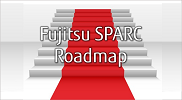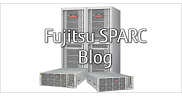Archived content
NOTE: this is an archived page and the content is likely to be out of date.
Software on Chip: Software processes built in to hardware
The SPARC64™ X+/SPARC64™ X’s "Software on Chip" is an innovative technology to achieve faster results by taking processes previously handled by software and putting them into the hardware (processor.)
Decimal Arithmetic Processing
SPARC64 X+/SPARC64 X employs a decimal floating-point arithmetic unit to execute decimal floating-point arithmetic processing directly by hardware for faster results.
Generally, computers perform arithmetic processing in binary numbers, whereas most of the numeric data handled by human beings are in decimal numbers. For this reason, conventional decimal floating-point arithmetic processing requires the decimal number data to be converted to binary by software, and then arithmetic processing to be performed by hardware. Computational results would then be converted from binary back to decimal number data by software.
The SPARC64 X+/SPARC64 X processor achieves high-speed data processing, as it can directly perform arithmetic processing of decimal numbers without the software having to perform the conversion to-and-fro binary.
For the decimal floating-point arithmetic processing, The SPARC64 X+/SPARC64 X supports IEEE 754. Oracle Databases can run even faster, as Oracle Number adopted in Oracle Databases is also supported.
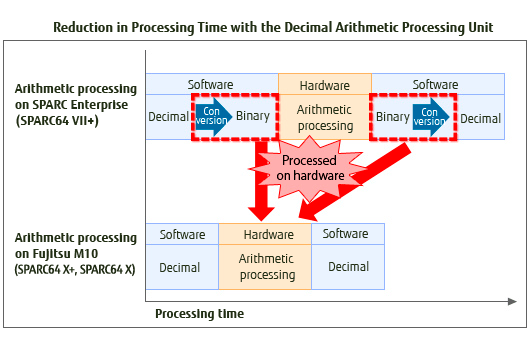
HPC-ACE (High Performance Computing Arithmetic Computational Extension)
On top of the existing SPARC V9 architecture, the SPARC64 X+/SPARC64 X adopts the HPC-ACE (High Performance Computing Arithmetic Computational Extension,) an extended instruction set architecture which was developed for the supercomputer.
Extension Registers
Extending the floating-point registers have increased the parallelism of complex arithmetic processing.
The number of floating-point registers in the SPARC V9 architecture is 32. Since this is not sufficient in order to process complex parallel arithmetic processing at high speeds, portions of the register needed to be saved temporarily on the cache and then restored to the register.
The SPARC64 X+/SPARC64 X has extended the number of floating-point registers to 128, which is 4 times as much as the SPARC V9 architecture. Processing speed will become faster with less need to save the data to the cache and restore.
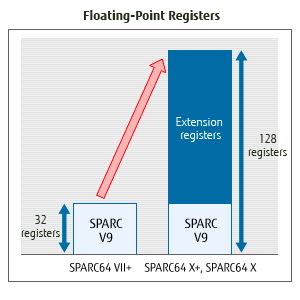
SIMD (Single Instruction Multiple Data)
SIMD (Single Instruction Multiple Data) is a technology that allows processing of multiple data in a single instruction.
The conventional arithmetic processing simultaneously executed two instructions in a single cycle. The SPARC64 X+/SPARC64 X can process large amounts of data at high speed by running maximum of 16 arithmetic processing simultaneously with two instructions.
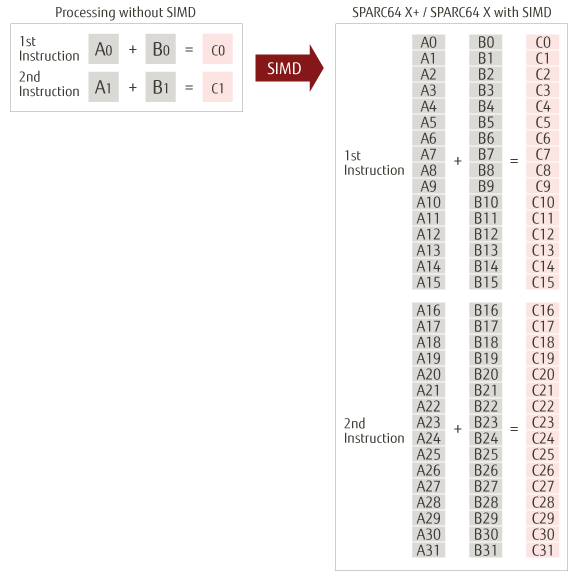
Oracle Database In-Memory option that runs in-memory processing with Oracle Database 12c corresponds to the SPARC64 X+/SPARC64 X SIMD for faster Oracle Database processing.
In addition, Oracle Solaris Studio to provide application development environment also corresponds to SIMD, which optimize your application to maximize the performance of the SPARC64 X+/SPARC64 X.
Cryptographic Processing
SPARC64 X+/SPARC64 X implements a cryptographic arithmetic unit. A dedicated cryptographic instruction executes encryption/decryption on the hardware at high-speed without the need for additional processing steps. Supported encryption modes are AES, DES, 3DES, RSA and SHA.
These cryptographic processing can be used on Oracle Solaris and Oracle Database.
Software supporting Software on Chip
The SPARC64 X+/SPARC64 X’s Software on Chip can be used on software below.
Oracle Database
| Function | Operating environment |
|---|---|
| The decimal floating-point arithmetic processing (Oracle Number) | Oracle Database 12c or later
Oracle Solaris 11.1 or later |
| SIMD (In-memory processing) | Oracle Database 12c Enterprise Edition
Oracle Database In-Memory Oracle Solaris 11.1 or later |
| Cryptographic processing | Oracle Database 12c Enterprise Edition
Oracle Advanced Security Oracle Solaris 11.1 or later |
User Application
| Function | Operating environment |
|---|---|
| The decimal floating-point arithmetic processing (IEEE754) | Oracle Database 12c or later
Oracle Solaris 11.2 SRU4 or later |
| SIMD |
